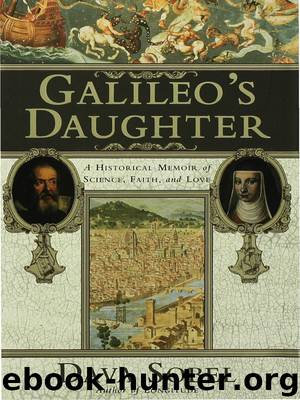Galileo's Daughter: A Historical Memoir of Science, Faith, and Love by Dava Sobel

Author:Dava Sobel [Sobel, Dava]
Language: eng
Format: epub
Tags: History, Science
ISBN: 9780802777478
Google: wCmZX8nYXD0C
Amazon: 0140280553
Barnesnoble: 0140280553
Publisher: Penguin
Published: 1999-01-02T00:00:00+00:00
Grand Duke Ferdinando II
Ferdinando ceded broad discretionary powers to his public health officers—a group of noblemen who answered directly and only to him. Their ordinances, aimed with good intentions at halting the spread of infection, affected every aspect of daily life. Citizens who resented the policing of their private affairs found ways around the law, and the commissioners found themselves sometimes taunted in the streets, pelted by stones, or formally denounced. For example, the Tuscan clergy, outraged by restrictions on gathering the multitudes together for public sermons and processions, appealed to Pope Urban VIII for redress. The pontiff responded by censuring the whole board of health—which included Galileo’s friend and former student Mario Guiducci—so that the board members were forced to perform salutary penance for their good deeds.
Hired monitors working for the Florentine Magistracy of Public Health patrolled the city, sending the stricken to the plague hospitals, burning their belongings, and disinfecting and boarding up their homes—with the other family members locked inside. Behind these sealed, marked doors, the relatives were expected to wait twenty-two days for release while subsisting on allotments of bread and money distributed by the magistracy. The confined raised these supplies from the street in baskets on ropes and lowered their corpses from the windows via the same system.
Most often the man of the house, at the first hint of “the bad disease” among the children, would move a mattress and some cooking utensils into his shop, hoping to avoid enclosure and carry on business as usual through the epidemic. When an artisan or apprentice fell sick, his fellow workers might care for him themselves, often breaking the law by failing to report his case and bribing a barber-surgeon or an herbalist for secret treatment. Though all parties faced strappado torture (being hung by the wrists with hands tied behind their backs) if discovered in such behavior, still they took the risk. Well-meaning weavers, gold beaters, and butchers managed to foil the magistracy— not just by virtue of their innate cleverness but because the inadequate army of health deputies could not catch every infraction. Also the 1,100 health workers, endowed with no special immunity, succumbed to the plague as readily as anyone else, constantly necessitating the appointment of new replacements from the ever-shrinking pool of available, able-bodied men.
In defiance of the public health edicts, rich and poor alike often tried to hide their sick in the bosom of the family, rather than relinquish them to the isolation of the hospital. If a blackened child died at home, at least the intimacy of the tragedy offered its own solace—and held out hope of a finagled death certificate that could convince grave diggers and sacristan to bury the body in the churchyard.
Download
This site does not store any files on its server. We only index and link to content provided by other sites. Please contact the content providers to delete copyright contents if any and email us, we'll remove relevant links or contents immediately.
Talking to Strangers by Malcolm Gladwell(13371)
The Compound Effect by Darren Hardy(8969)
Tools of Titans by Timothy Ferriss(8398)
Wonder by R. J. Palacio(8113)
The Lover by Duras Marguerite(7903)
A Court of Wings and Ruin by Sarah J. Maas(7848)
The Circle by Dave Eggers(7115)
Deep Work by Cal Newport(7085)
Kaplan MCAT General Chemistry Review by Kaplan(6934)
To All the Boys I've Loved Before by Jenny Han(5852)
Wiseguy by Nicholas Pileggi(5787)
The Body: A Guide for Occupants by Bill Bryson(5098)
Eat That Frog! by Brian Tracy(4542)
1,001 ASVAB Practice Questions For Dummies by Powers Rod(4509)
Cracking the GRE Premium Edition with 6 Practice Tests, 2015 (Graduate School Test Preparation) by Princeton Review(4294)
Pre-Suasion: A Revolutionary Way to Influence and Persuade by Robert Cialdini(4233)
Barron's AP Biology by Goldberg M.S. Deborah T(4150)
ACT Math For Dummies by Zegarelli Mark(4049)
Alive: The Story of the Andes Survivors by Piers Paul Read(4033)
